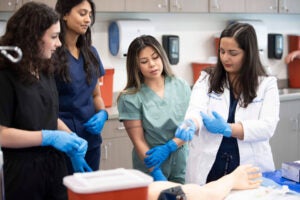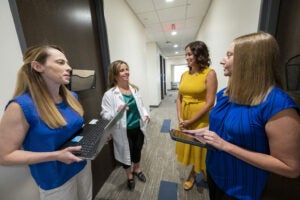Supervised Clinical Practice Experiences are offered in the following disciplines and can be completed in any order (this will be assigned at the discretion of the program).
The clinical team from the program will determine clinical assignments. The primary responsibility of the program is to ensure quality clinical experience and education. Students are not required to provide their own clinical sites or preceptors for any required rotations. Although preferences are considered, the program does not guarantee personal preferences can be accommodated.
Clinical rotations are full-time obligations that on average will require 40 hours per week of student attendance. Additionally, students will have associated homework, patient logging and prep work during each rotation.
Internal Medicine
Focuses on the evaluation and management of the ambulatory and hospitalized patient on an inpatient medicine service. Students learn how to take an accurate and pertinent history, conduct a physical examination, recognize patterns of illness and acquire approaches to disease management. The student participates in the full range of inpatient care, formulating a problem list, taking part in daily rounds, performing technical skills, participating in the management of patient problems and planning for discharge and follow-up care.
Family Medicine
Focuses on the evaluation and management of the ambulatory patient in a outpatient care setting. The student participates in the full range of outpatient care through the life span, including collecting pertinent patient data and the information from diagnostic studies, developing a differential diagnosis, oral and written case presentations and formulating management plans including patient education, appropriate referral and follow-up care. This clinical rotation encompasses the comprehensive and longitudinal care of patients with a special emphasis on care of individuals in the context of families and communities.
Emergency Medicine
Focuses on the evaluation and management of patients in the emergency department setting. The student participates in the appropriate triage, stabilization, diagnosis and management of patients with urgent and emergent problems and develops skills in working with the pre-hospital emergency medical team and secondary referral systems.
Pediatrics
Focuses on the evaluation and care of infants and children in an ambulatory setting. The student participates in well-child preventative care, the evaluation and management of common pediatric problems and the patient education of children and their caregivers.
Surgery
This supervised clinical practice experience gives the student many opportunities to evaluate and manage surgical patients. This experience is designed to augment, strengthen and refine the student’s surgical skills and ability to perform pre-operative, intra-operative and post-operative care. The student is expected to gain awareness of the contributions of other health professions in the overall delivery of surgical care as well as for the role a PA may play in its delivery.
Behavioral Health
Focuses on the evaluation and management of patients with psychiatric and behavioral health problems in ambulatory and/or inpatient settings. The student participates in psychiatric evaluations, monitoring of therapy and appropriate referral to other health care professionals and facilities.
Obstetrical and Gynecological Medicine
This supervised clinical practice experience provides the PA student with practical clinical experience in evaluation and management of normal and abnormal conditions in OB/GYN. In addition, students will learn to provide prenatal and postpartum care, gynecologic care, family planning, health education and counseling.
Elective
Designed to provide the students with an elective opportunity in any medical or surgical specialty/subspecialty, academic setting or other discipline.
Background Checks and Other Screening Requirements
All clinical rotations require screening measures. Prior to final acceptance, those individuals offered a seat in the University of Pittsburgh Physician Assistant Studies program, will be required to complete a criminal background check, health assessment and drug screen. Matriculation as a student in the program is conditional upon these results. Failure to complete this process and submission of documents on or before the deadline given will result in forfeiture of your seat. If a student declines to undergo this process, or if findings of a grievous nature are revealed, the offer of admission will be revoked. During enrollment, repeat background checks, health and drug screens will be required. If a student declines to undergo a background check, health assessment or drug screen while enrolled in the program or if findings of a grievous nature are revealed, this will be grounds for dismissal from the program.
This program requires the student to complete portions of their education (e.g. clinical preceptorship, practicum) at facilities external to the University to meet requirements for graduation. Many of these external facilities require screening measures such as, but not limited to, background check, child abuse clearance, health appraisal, fingerprint-based background check and/or drug test prior to placement at the facility. The results of these requirements may limit and potentially eliminate placement options for the student which can, in turn, result in an inability to meet graduation requirements. Additionally, conviction of a misdemeanor, felony or felonious or illegal act may prevent the student from becoming credentialed and/or licensed to practice in the field.



